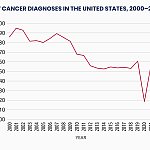
The number of people with type 2 diabetes is increasing worldwide. According to the International Diabetes Federation, 1 in 9 adults worldwide currently lives with the condition, and by 2050, it will be 1 in 8.
In the United States, the
Type 2 diabetes is a risk factor for heart disease, which, according to the
A major study has now added to evidence that a healthy, plant-rich diet may reduce a person’s risk of developing both diabetes and heart disease.
The study findings, presented at NUTRITION 2025, the annual flagship meeting of the American Society for Nutrition, suggest that eating a diet high in
“These are highly significant — if the findings are true then it could lead to an effective measure of significantly reducing the risk of these conditions along with reducing health care costs and improving patient quality of life with an easy non-medical method from diet. However, before we get too excited I would like to see a lot more of the methods here — what was the population they looked at, what measures and methods were used and what was the statistical techniques employed.”
— Eamon Laird, PhD, Assistant Lecturer Nutritional Science at Atlantic Technological University (ATU) Sligo & Visting Adjunct Professor Trinity College Dublin, who was not involved in the study.
The findings are yet to be published in a peer-reviewed journal.
Researchers carrying out the observational study analyzed data from more than 200,000 adults in the U.S. All were nurses or other health professionals, and almost 80% were women.
The data followed participants for up to 36 years, during which time more than 20,000 developed diabetes and almost 16,000 were diagnosed with heart disease.
All participants filled in food-frequency questionnaires, from which the researchers assessed their intake of phytosterols. From the responses, they separated the participants into five groups, from highest to lowest intake of phytosterols in their diet.
Those in the highest group consumed around 4-5 servings of vegetables, 2-3 servings of fruit, two servings of whole grains, and half a serving of nuts per day.
People in the top fifth for phytosterol intake were 9% less likely to develop heart disease and 8% less likely to develop type 2 diabetes than those in the bottom group.
“High blood cholesterol can increase the risk of heart disease. In general, increasing the amount and variety of plants in our diet is known to reduce the risk of heart disease. It would be interesting to see more research in this field to determine the extent of the role of phytosterols in this process.”
— Megan Smith, a U.K.-registered dietitian, who was not involved in the study.
Phytosterols, found in many plant foods, comprise two types of bioactive compounds: plant sterols and plant stanols.
“Phytosterols are cholesterol-like compounds which inhibit cholesterol from being absorbed in the intestine, which can lower cholesterol in the blood,” Smith explained.
“Although there aren’t many studies, there is a growing evidence base to suggest that phytosterols are anti-inflammatory and may have a role in improving glucose and lipid metabolism, and insulin resistance. However, to draw practical conclusions in this area, more research is needed.”
— Megan Smith, RD
By interfering with the absorption of dietary cholesterol, phytosterols can help lower levels of low-density lipoprotein (LDL), or ‘bad’ cholesterol in the blood, a major risk factor for heart disease.
The researchers analyzed blood samples from more than 40,000 participants to look for metabolic biomarkers. They found that both total phytosterol and a particular form, β-sitosterol, were associated with metabolic markers and metabolites that may reduce the risk of heart disease and diabetes. They suggest this could indicate a possible mechanism for the association.
Fenglei Wang, PhD, research associate at the Harvard T.H. Chan School of Public Health, who presented the research, explained:
“Our clinical biomarker and metabolomic results suggest the involvement of insulin activity, inflammation, and the metabolism of metabolites associated with type 2 diabetes and cardiovascular disease.”
“This suggests that phytosterol might reduce risk by alleviating insulin resistance and inflammation,” he added.
He also suggested that the gut microbiome might play a role, as they identified several microbial species and enzymes associated with higher phytosterol intake that may influence the production of metabolites associated with a lower risk of diseases.
“Phytosterol absorption is generally low, with less than 5% of dietary phytosterols being absorbed into the bloodstream. In addition, the typical Western diet is often low in phytosterols.”
— Eamon Laird, PhD
Phytosterols are found in all plant foods, with the highest concentrations in unrefined plant oils, such as corn, sunflower, soybean and olive. Nuts, seeds, wholegrains and legumes are also good dietary sources of phytosterols.
Adding avocadoes, broccoli, cauliflower, passion fruit, raspberries and oranges to your diet can also help increase your phytosterol intake.
However, even with a plant-rich diet, it is quite hard to reach the 2g per day of phytosterols that clinical studies recommend for a significant reduction in LDL-cholesterol simply from diet.
Smith told Medical News Today:
“It is generally thought that the amount of phytosterols eaten from food alone may be unlikely to have any meaningful effects to lower cholesterol. We may get around 200 – 400 mg/day with an omnivore diet. This can double in vegan or vegetarian diets.”
“If we were to eat foods which are supplemented with plant sterols or stanols (typically as fortified spreads and dairy drinks) this can increase to 0.75 – 2g per serving. They can also be taken as a supplement. U.K. guidance suggests that eating between 1.5 – 3g of plant stanols and sterols in addition to having a balanced diet can contribute to lower LDL cholesterol,” she added.
However, she cautioned: “For those with increased cholesterol levels, phytosterols can lower LDL cholesterol in the blood. Note, this should not be used as a replacement for cholesterol-lowering medication. There is also no benefit for those with normal levels of cholesterol, and is not recommended during pregnancy, breastfeeding or for children under five.”





